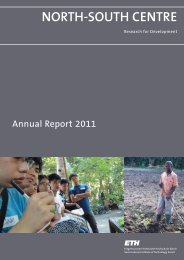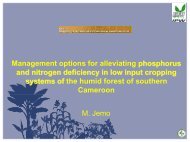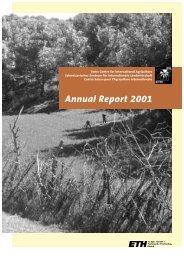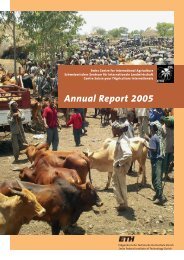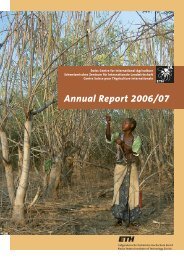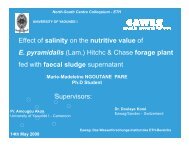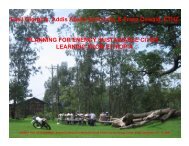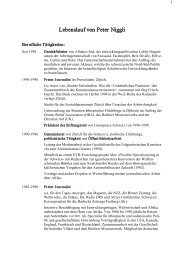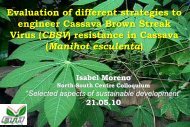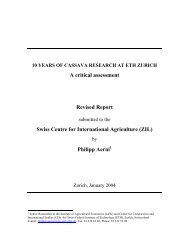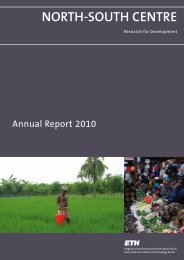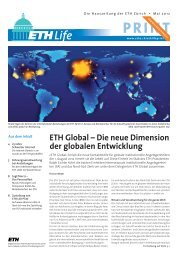NORTH-SOUTH CENTRE - ETH - North-South Centre North-South ...
NORTH-SOUTH CENTRE - ETH - North-South Centre North-South ...
NORTH-SOUTH CENTRE - ETH - North-South Centre North-South ...
Create successful ePaper yourself
Turn your PDF publications into a flip-book with our unique Google optimized e-Paper software.
Ethanol production impacts on<br />
land use and deforestation<br />
Less-developed countries such as Brazil and Indonesia with<br />
established biofuel production capacities and high land<br />
surpluses stand to benefit from increasing biofuel demand<br />
in both developed and developing economies. However,<br />
there is currently a debate on potential negative impacts<br />
of biofuels. More precisely, the links – either direct or indirect<br />
– between bio-ethanol production, land use and forest<br />
conversion are still not well-understood, neither at the<br />
conceptual nor at the empirical level. Therefore, the objective<br />
of this project is to fill the gap in the literature, by<br />
investigating these direct and indirect links and by measuring<br />
them empirically. In addition, the research findings<br />
from this project are expected to be useful for optimal<br />
policy design both in current biofuel producer and consumer<br />
countries. Potential future producers, such as <strong>South</strong><br />
Africa, Colombia and Angola, may also benefit from policy<br />
implications derived from the research output.<br />
output of the food sector. Finally, labour mobility between<br />
sectors and regions tends to decrease food production but<br />
also deforestation. The overall impact of ethanol production<br />
on forest conversion is ambiguous, providing a number<br />
of interesting pointers to further, empirical research.<br />
The second phase of the project is currently being prepared.<br />
It consists on testing the theoretical results, using empirical<br />
data from Brazil – the second world largest bio-ethanol<br />
producer, and an important consumer country. Although<br />
some data is available on-line, a stay in Brazil is necessary<br />
to collect more secondary data via key informants such as<br />
local researchers and governmental institutions (both at<br />
federal and state levels). We also consider this stay to be<br />
an opportunity to disseminate and discuss our theoretical<br />
results with our local partners and with representatives of<br />
government institutions.<br />
The first phase of the project consisted in conceptualising<br />
the impacts of ethanol production resulting in a theoretical<br />
paper identifying three potential effects of ethanol production<br />
on land use and deforestation. First, the standard<br />
and well-documented effect of direct land competition<br />
between rival uses increases deforestation and decreases<br />
food production. Second, an indirect displacement of<br />
food production across regions, provoked by a shift in the<br />
price of food, increases deforestation and reduces the total<br />
78<br />
Capacity development<br />
Research fellowships<br />
Research fellow<br />
Saraly Andrade de Sa, <strong>ETH</strong> Zurich, Switzerland<br />
Supervisors<br />
Stefanie Engel, <strong>ETH</strong> Zurich, Switzerland;<br />
Charles Palmer, London School of Economics, UK<br />
Collaborators<br />
Charlotte Opal, EPFL, Switzerland;<br />
Sven Wunder, CIFOR, Brazil;<br />
Paulo Moutinho, Amazon Environmental<br />
Research Institute IPAM, Brazil<br />
Duration<br />
February 2009 – February 2011<br />
Sugarcane field in São Paulo State,<br />
the main ethanol production area of Brazil




